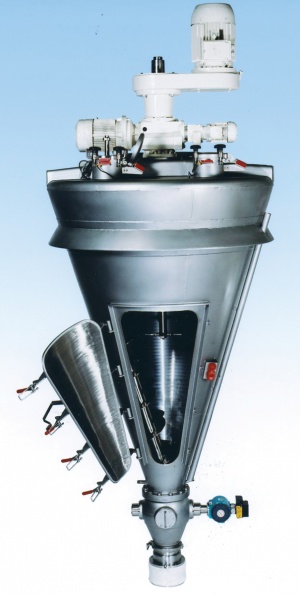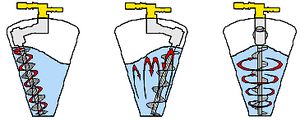Difference between revisions of "Nauta Mixers"
m |
|||
| Line 1: | Line 1: | ||
[[Category:Mixing]]{{Knoppen}} | [[Category:Mixing]]{{Knoppen}} | ||
[[File:Nauta-mixer.jpg|thumb|right| Nauta mixer]] | [[File:Nauta-mixer.jpg|thumb|right| Nauta mixer]] | ||
[[File:Nauta_mixing_principle.jpg|thumb|right| Nauta mixing principle]] | [[File:Nauta_mixing_principle.jpg|thumb|right| Nauta mixing principle]] | ||
| Line 16: | Line 9: | ||
The mixing is carried by means of 3 distinct intermixing actions: | The mixing is carried by means of 3 distinct intermixing actions: | ||
*The screw agitator, turning on its axis, produces a lifting action as it spirals the materials in an upward flow. | *The screw [[Agitators|agitator]], turning on its axis, produces a lifting action as it spirals the materials in an upward flow. | ||
*At the same time, orbiting the tank, the screw removes material away from | *At the same time, orbiting the tank, the screw removes material away from the wall and deflects it into the centre of the tank. | ||
*Material lifted by the screw gravitates downward, thoroughly intermixing with material being spiraled upwards. | *Material lifted by the screw gravitates downward, thoroughly intermixing with material being spiraled upwards. | ||
The typical speed of the central screw is 70 to 80 Rpm. The Tip speed can | The typical speed of the central screw is 70 to 80 Rpm. The Tip speed can fluctuate from 1 to 3 m/s. The result is most intimate intermingling of all ingredients. The mixing time is depending on product characteristics, mixing accuracy and batch size | ||
==Example== | ==Example== | ||
Conical Double | Conical [[Double Shaft Mixers]] consists of driving part, screw agitator and reverse cone cylinder. The agitator are two asymmetrically helixes. They rotate around their own axes and revolve around the cone’s center axis at the same time with the help of the arm rotation effect. The material will be elevated repeated through the rotation and revolution of the helix and form shearing, convection and diffusing in the cone cylinder to realize perfect mixing effect. | ||
Latest revision as of 02:00, 19 May 2014
Nauta Mixers (also called Conical Screw Mixers) make use of a conical chamber with a vertical screw that mixes the powder or substance.
Working principle
First step is charging of mixer from the top, manually or vide pneumatic or mechanical conveying. After the mixer is charged the mixing process starts. The mixing is carried by means of 3 distinct intermixing actions:
- The screw agitator, turning on its axis, produces a lifting action as it spirals the materials in an upward flow.
- At the same time, orbiting the tank, the screw removes material away from the wall and deflects it into the centre of the tank.
- Material lifted by the screw gravitates downward, thoroughly intermixing with material being spiraled upwards.
The typical speed of the central screw is 70 to 80 Rpm. The Tip speed can fluctuate from 1 to 3 m/s. The result is most intimate intermingling of all ingredients. The mixing time is depending on product characteristics, mixing accuracy and batch size
Example
Conical Double Shaft Mixers consists of driving part, screw agitator and reverse cone cylinder. The agitator are two asymmetrically helixes. They rotate around their own axes and revolve around the cone’s center axis at the same time with the help of the arm rotation effect. The material will be elevated repeated through the rotation and revolution of the helix and form shearing, convection and diffusing in the cone cylinder to realize perfect mixing effect.
Applications
Vertical ribbon blenders are generally used in case of applications that require gentle mixing action and minimal heat generation at the same time these mixers can also be used for applications that requires high shear mixing this is accomplished using lump breakers, which is driven separately.
- Mixing of free flowing powders
- Moistening of powders
- Coating
- Granulation
- Drying of powders
- Mixing of slurries

